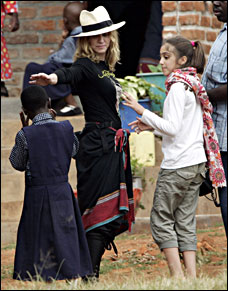 I think Madonna has now made Malawi the place to be. She adopted (or at least is trying to) a child from Malawi, and since the white gays follow her every move, they’re making their way, too!
I think Madonna has now made Malawi the place to be. She adopted (or at least is trying to) a child from Malawi, and since the white gays follow her every move, they’re making their way, too!
I just saw this on The Advocate. Gay screenwriter John August and straight actor Ryan Reynolds took a trip to Malawi to help build an orphanage for the many children who have lost their parents, largely due to the HIV/AIDS epidemic. There are lots of photos from this trip that you’ll have to click on the link to see—I won’t post them for fear of being sued. Here’s how August sums up his trip:
It’s tempting to try to equate what’s happening in Africa with the American experience, but it’s a mistake. Our poor people don’t forage for roots in a famine. The African AIDS crisis is of a completely different scale and time line. After a church service, the orphans—my orphans—got pamphlets in Chichewa with a red AIDS ribbon on the front. I was excited until I realized there were only Bible verses printed inside. Cultures move at their own speed, and my frustration can’t change that.
If there’s a commonality I saw, it was the way the orphans of Malawi have banded together. Lacking parents and traditional families, they take care of each other. That’s long been part of the queer experience. For generations, gays and lesbians were virtual orphans, disowned by their families. That’s changing, quickly. My hope for Malawi, for Africa, is that this upcoming generation can be the last of its kind. If this generation of orphans begets another generation of orphans, we’ll have all failed.
Ugh. This is so goddam annoying (my orphans? Do they really belong to you?). I am sick to death of celebrities who don’t know anything, but get press and accolades for pretending to (cultures “move at their own speed?” Was that a nice way of saying “backwards?).
First of all, it is simply not true that people in the United States don’t forage for food. Been to a major city lately? In NYC, one can see homeless people by the hundreds on a daily basis picking thru the trash cans for food, or for aluminum and plastic bottles to recycle for cash. It may not be foraging for roots, but it’s equally as outrageous. And the African AIDS epidemic is really not of a different scale and timeline when you compare it to African Americans, quite frankly (see your local epidemiologist).
On the one hand August is saying that we can’t compare poverty or AIDS in Africa with the US. So making a comparison about poverty and AIDS (read: N*gg***, stop complaining!) is impossible, but making a link between being gay and being an orphan in Africa is somehow on equal footing? Chile, please! What happened to Oscar Wilde was fucked up, but at the end of the day, he was a white man (an aristocrat!) from the society that colonized Malawi, and helped create or profited from the condition that you went there to help “solve.” Do those things add up to you?
I have not been to Africa yet—before the nay-sayers come for me—for one reason. I cannot afford to. But when I go, I don’t want to provide “aid.” Plain and simple. I think there are Africans doing hot shit and I wanna know what they’re doing, how they’re doing it, and what Black folks can globally create to do for each other.
I wanna know about the LGBT Ugandans who are organizing to decriminalize “homosexuality.” I wanna know about the women in Kenya who formed their own community, free of men! …And a bunch of other shit I don’t know.
Enough of white do-gooders. I want to support African innovation for a healthy and sustainable continent. What are Africans doing to that end? They’re there. And they are here and in Europe and in Latin America. I don’t want Africans to merely serve as the vehicle to prop up notions of white charity—in the face of so much destruction. To that end, The Christian Science Monitor has a story about the whether celebrity photo ops and volunteering does Africa any good.

 Not everybody needs a blog. Others, however, were born for the artform. Meet
Not everybody needs a blog. Others, however, were born for the artform. Meet  because it doesn’t take the same-ole same ole approach, but really looks at how the financial support that was once there for gangsta (and gangsta-esque) hip-hop has now washed under. Ta-Nehisi Coates writes:
because it doesn’t take the same-ole same ole approach, but really looks at how the financial support that was once there for gangsta (and gangsta-esque) hip-hop has now washed under. Ta-Nehisi Coates writes: Lastly, my homegirl
Lastly, my homegirl  I think Madonna has now made Malawi the place to be. She adopted (or at least is trying to) a child from Malawi, and since the white gays follow her every move, they’re making their way, too!
I think Madonna has now made Malawi the place to be. She adopted (or at least is trying to) a child from Malawi, and since the white gays follow her every move, they’re making their way, too!